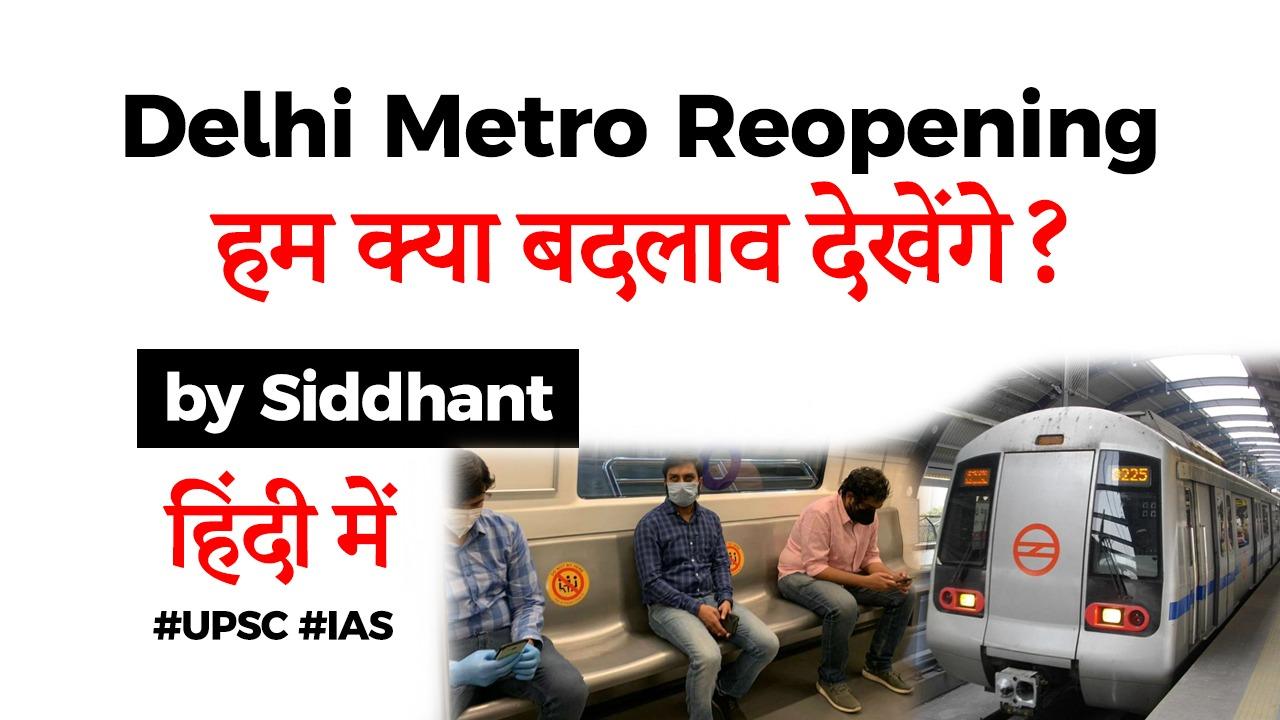Table of Contents
STARTS
- Over five months after the Covid-19 pandemic halted its operations, the Delhi Metro is likely to resume as part of the relaxations offered by the Centre under Unlock 4.0, the fourth phase of the gradual reopening of the economy.
- The Delhi Metro, in consultation with the Union Ministry of Housing and Urban Affairs, has prepared a Standard Operating Procedure (SOP).
When will the Delhi Metro start rolling?
- That decision lies entirely with the Union Ministry of Home Affairs (MHA), which issues the ‘unlock’ guidelines after consulting all stakeholders.
- In metro’s case, the primary stakeholders are the Ministry of Housing and Urban Affairs, the Delhi government and the Delhi Metro Rail Corporation (DMRC). All three have conveyed their readiness to resume services to the MHA.
Should the metro services be allowed in Delhi given that it continues to report over 1,000 cases daily?
- The Delhi government is eager to resume metro services as part of its measures to revive the city’s economy. While markets, other modes of transport, hotels and restaurants have already been allowed in the city, businesses are not picking up pace due to low footfall.
- Traders believe only the metro, which is considered the city’s lifeline, can now come to their rescue. The DMRC, on its part, maintains that it can restart operations at a short notice of two days. The Ministry of Housing and Urban Affairs headed by Hardeep Singh Puri is also in favour of allowing metro services
What will change for commuters once Delhi Metro services resume?
- People will be allowed to enter the metro stations through selected gates for ensuring proper queues and stickers have been pasted on the floor for ensuring adequate gaps.
- Every person will have to wear masks. Aarogya Setu app has not been made mandatory, however, authorities will encourage people to download the app. At the frisking points manned by CISF jawans, thermal screening will be carried out.
Are Delhi Metro tokens being discontinued?
- Yes, Delhi Metro plans to make the use of smart cards mandatory. Not just tokens, all forms of cash transactions are likely to be discontinued for the time being.
- So recharging a smart card will also require a person to swipe his credit or debit cards. The ticket-vending machines installed in the stations will also not accept cash.
- Commuters will have to make use of other cashless modes, including credit or debit cards, e-wallets like Paytm and new smart cards ‘Autope’ which can be linked with bank accounts.
What changes inside the metro stations and train coaches?
- There will be frequent announcements urging people to adhere to social distancing for one. Not more than three people will be allowed inside lifts at once.
- One can expect more private security guards around. The public toilets are supposed to be sanitised more frequently.
- Train frequency will be less initially and scaled up based on demand. Alternate seats will have to be left vacant and a distance of one metre will have to be maintained between two persons standing.
What other steps are expected to prevent the spread of Covid-19?
- As metro coaches are essentially closed spaces with central air-conditioning, the trains will halt at terminal stations with their doors open to infuse fresh air in the interiors.
- The temperature inside the coaches will be between 24 and 28 degrees Celsius and as far as possible.
- The parking facilities at the stations are not likely to be available to discourage overcrowding
Latest Burning Issues | Free PDF






















 WhatsApp
WhatsApp